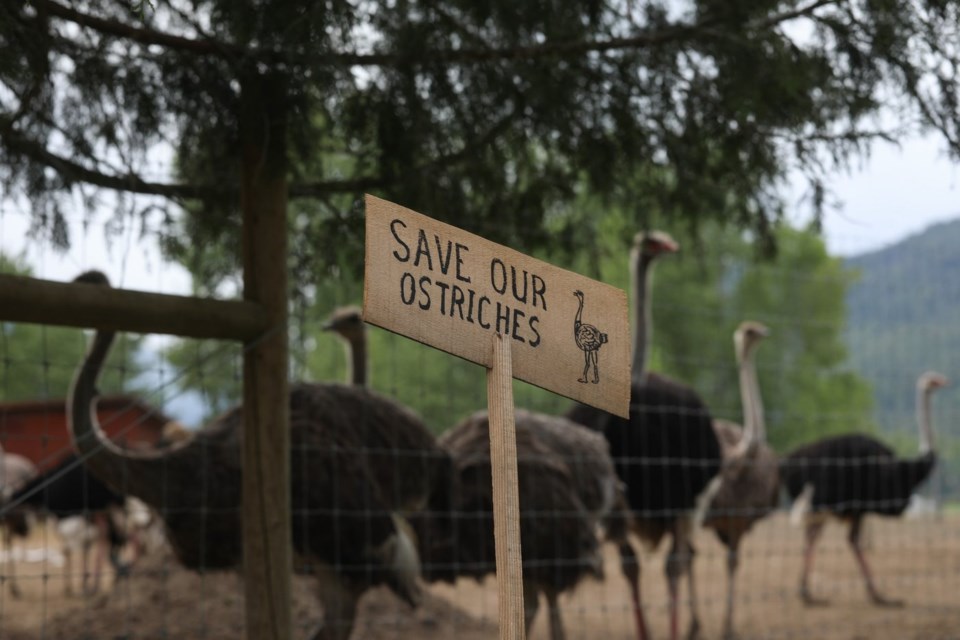A co-owner of the B.C. ostrich farm fighting to stop a cull of its 400-strong flock says the Canadian Food Inspection Agency is "actively mobilizing" to destroy the birds over the next few days, and is pleading with the Federal Court of Appeal in Ottawa for another stay of execution.
Universal Ostrich Farms in Edgewood, B.C., has been attempting to stop the agency from destroying the birds since the cull was ordered amid an avian flu outbreak in December that would go on to kill 69 ostriches.
The farm has lost in Federal Court and the Federal Court of Appeal, but on Thursday its lawyer sought another temporary stay on the cull order, filing a series of documents as the farm seeks a hearing in Canada's high court.
Co-owner David Bilinski alleges in an affidavit sworn on Wednesday that he was told by an agency "enforcement member" that the cull is in the works for the "immediate destruction of our entire ostrich flock."
"Based on communications received and preparations observed, I believe this destruction will occur within the next 2-4 days," Bilinksi's affidavit says.
The farm's lawyer, Umar Sheikh, also says in a letter filed in the Federal Court of Appeal that the agency is "imminently" mobilizing to enforce the cull order.
The court upheld the cull order last month, but identified two avenues for the farm to further stave it off, including asking the agency or the minister for reconsideration in light of fresh evidence, or seeking a hearing at the Supreme Court of Canada.
Sheikh says in his letter that the farm wants to explore asking for reconsideration and intends to seek a hearing at the top court.
He said on Friday that he and the farm were doing "everything we can" to save the lives of the ostriches, including asking the minister to reconsider.
Sheikh declined to make further comment.
The farm, which argues the birds are now healthy, has maintained that they pose no threat and are scientifically valuable.
Their cause has attracted supporters seeking to avert a cull, camping out at the farm and staging musical concerts.
The farm's situation has also drawn attention from critics of government overreach and officials in the U.S. administration of President Donald Trump, including Health Secretary Robert F. Kennedy Jr. who has repeatedly called for the animals to be spared and studied.
The farm's latest court filings say allowing the cull to happen would render their legal efforts at the high court and the procedural efforts with the government both "moot."
"CFIA is now mobilizing teams, equipment, and resources for the destruction of the flock," the farm's court documents say. "The urgency cannot be overstated. CFIA has scheduled the destruction to begin within days. Once these genetically unique birds are destroyed, no remedy can restore them."
Universal Ostrich Farms claims the agency has refused requests for an "administrative pause" on the cull, which would "irreversibly destroy a flock built over decades."
The filings say the birds have been under quarantine supervised by the agency, but the approximately 400 ostriches could be "slaughtered at any moment," unless the court orders a stay pending another appeal.
The farm claims the flock has been healthy for more than 230 days with no new avian flu infections, and the last death recorded in mid-January.
The appeals court, the farm says, identified legal "uncertainty" in its ruling last month and pausing the cull would allow it to apply for a hearing in the high court by Oct. 3, and submit a request for reconsideration to the federal minister in the coming days.
"This creates precisely the type of issue the Supreme Court exists to resolve," the documents say.
"The intersection of this legal uncertainty with the stark facts here, healthy animals facing destruction based on an emergency that ended seven months ago, presents an ideal vehicle for the Supreme Court to provide needed clarity."
The Canadian Food Inspection Agency said in a statement that it "does not generally release details about the operations of individual farms to help protect the privacy of producers."
"Accordingly, specific operational plans and dates will not be shared with the public in advance," it said, repeating previous statements.
The agency says on its website that allowing a flock previously exposed to avian flu to remain alive means a potential source of the virus persists and increases the risk of reassortment or mutation of the virus.
"Even when ostriches appear healthy, they can still spread disease," it says.
It says that it learned during the legal proceedings that people associated with the farm had reported the detection of H5N1 avian flu antibodies in their blood.
"While no serious illnesses were reported to public health authorities, this apparent evidence of ostrich-to-human transmission is a concern and highlights the risk of delays in completing the disposal of an infected flock."
This report by The Canadian Press was first published Sept. 5, 2025.
Darryl Greer, The Canadian Press



